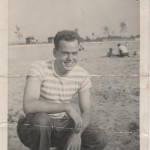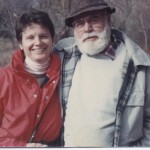Twenty-plus years ago, when I decided to freelance full-time, my father wrote me a long letter extolling the virtues of corporate job security, medical benefits, paid holidays and 401(k)s. Not an unusual reaction for a parent concerned his thirty-something offspring had lost her mind. But it was unusual for my father who was always a little too incorrigible for the lock-step of big business.
Different and daring were my father’s watchwords. He worked his way to the top of his profession as a mechanical engineer with no high school diploma. His brilliant mind and unique approach to problem-solving were his keys to success and upward mobility. When my Dad thought over a problem, you could see him mentally take flight, like a soaring hawk, scanning the landscape of his past experience and present knowledge. Eventually his eyes would refocus on you as he swooped back from the distance with just the right answer.
Although his methods were as unpredictable as they were unorthodox, “Jack” Thompson became known as the man who could solve the toughest engineering puzzle. Every few years a new company would lure him from the firm he was with to unravel another Gordian knot. Ever restless for new challenges, Dad was always ready to go–despite promises of job security, seniority and fat pensions from his old firm.
His freewheeling approach to his career began when he came out of the service in 1947 and his family moved to Colorado Springs. My grandfather was too ill to work. Since sixteen, my father had been the family’s primary breadwinner. Before going into the navy, Dad had worked as a draftsman for a small engineering company in Detroit, Michigan. In Colorado Springs, though, there was no work for draftsmen. Dad washed windows.
One day on a scaffold outside an open office window, he heard two men inside discussing their need for a structural engineer. My father was not a structural engineer. He had only been on the drafting board for a year or so. But he knew what structural engineers were and what they did. Most importantly, he knew they made a lot more money than window washers.
 I can almost see him as he stood there–tall, lean, broad-shouldered, fair and freckled, his red hair already receding from his forehead–listening outside that window, arm frozen in mid-swipe, thinking at lightning speed, weighing options, calculating risks. He certainly had that intense look on his face as his mind soared and searched among the things he had learned on the drafting board, in the navy, and from his father, a builder. He made his decision. He stepped from the scaffold through the open window. “I’m your man,” he announced to the startled men. Although they were skeptical, to say the least, by looking older than his years, having a quick tongue, a little knowledge, and a lot of chutzpah, Dad got the job.
I can almost see him as he stood there–tall, lean, broad-shouldered, fair and freckled, his red hair already receding from his forehead–listening outside that window, arm frozen in mid-swipe, thinking at lightning speed, weighing options, calculating risks. He certainly had that intense look on his face as his mind soared and searched among the things he had learned on the drafting board, in the navy, and from his father, a builder. He made his decision. He stepped from the scaffold through the open window. “I’m your man,” he announced to the startled men. Although they were skeptical, to say the least, by looking older than his years, having a quick tongue, a little knowledge, and a lot of chutzpah, Dad got the job.
During the day, Dad made drawings. A natural designer and an excellent draftsman, he had picked up enough about structural engineering at the engineering company to make the drawings plausible to the casual observer. But he wasn’t a fool. He knew what was at stake. Under the table he kept a notepad and wrote down everything he didn’t know and needed to. Every night, he found the answers at the library. In the morning, he erased his errors, corrected his drawing, and kept going. Any moment he expected to be found out and fired. He never was.
How much of this story is true, I don’t know. But its truth doesn’t really matter. What matters is what I learned from the story he told: That it’s necessary to know your limits, but just as necessary to push them; that knowing where to look for the answers is sometimes as valuable as having them; that self-confidence inspires confidence in others; and that you can’t fail if you don’t quit.
As a freelancer, I’ve needed those lessons. Practically every job challenges me to push my limits. Although I’ve taken on many projects that have been beyond the knowledge and skills I had at the time, I knew I could get the skills and find the answers I needed to accomplish them. Knowing that, I could act confidently and get the job even if, privately, I had qualms and doubts. And despite the low times that come to every freelancer, I’ve never given up, because my father never taught me how to fail. That inability to believe in failure was my father’s greatest gift to me, besides his love.
Dad approached life as an engineering problem to be analyzed and solved. Nothing was impossible. If something doesn’t work, Dad said, you can always change your mind, change your direction, change your decision. You haven’t failed just because you decide to do something different.
That’s why it seemed strange that, when I decided to step through my own open window, my father would try to dissuade me. But at sixty, he was not as big on risk-taking as he had been at twenty. Not all the risks he’d taken had worked out well. And as the result of thirty-odd years of job-hopping, he had no pension, no 401(k). As his friends retired and played golf, Dad continued working.
It was out of love, then, to save me from his mistakes, that my father encouraged me to stick with a “real” job with sick pay and a pension plan. But it was his example, not his advice, I chose to follow.
 The legend my father created with his story of becoming an accidental structural engineer has fueled my belief in myself and driven my life and my career. Even now, when work is slow, when clients don’t pay on time, when I wonder where the mortgage will come from (let alone my retirement), I still see my dad stepping through that open window with only his courage, his intelligence, and his determination to survive. And it gives me the strength to step through mine.
The legend my father created with his story of becoming an accidental structural engineer has fueled my belief in myself and driven my life and my career. Even now, when work is slow, when clients don’t pay on time, when I wonder where the mortgage will come from (let alone my retirement), I still see my dad stepping through that open window with only his courage, his intelligence, and his determination to survive. And it gives me the strength to step through mine.

No Comments